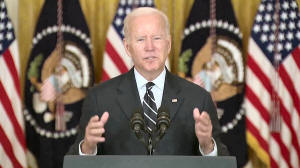Biden, pushing $1.75 trillion spending bill, dealt setback on
infrastructure
 Send a link to a friend
Send a link to a friend
 [October 29, 2021]
By Trevor Hunnicutt and Richard Cowan [October 29, 2021]
By Trevor Hunnicutt and Richard Cowan
WASHINGTON (Reuters) -U.S. President Joe
Biden was dealt a setback on Thursday as the House of Representatives
abandoned plans for a vote on an infrastructure bill with progressives
seeking more time to consider his call for a separate $1.75 trillion
plan for climate measures, preschool and other social initiatives.
Biden had sought to unite his party behind the climate and social
spending plan with personal appeals on Thursday, and had pressed for a
Thursday vote on the $1 trillion infrastructure bill, another main plank
of his agenda.
He hoped a framework on the larger measure would convince progressive
House Democrats to support the infrastructure bill, but their insistence
that the two move together led House leaders to abandon a planned vote,
leaving Biden empty handed.
"We have a historic economic framework" that will create jobs and make
the United States more competitive, Biden said after a last-minute trip
to Congress to enlist progressives' support. He then departed for a
summit of leaders from the Group of 20 countries and global climate
talks.
He left behind a U.S. Congress bubbling with conflicts and unanswered
questions, but one that seemed to be inching towards votes on his
economic agenda, perhaps within days.
How, exactly, it could come together remained a puzzle.

"Dozens of our members insist on keeping both bills linked and cannot
vote only for one until they can be voted on together," Representative
Pramila Jayapal, a leader of House progressives, said in a statement.
The fight over $2.75 trillion in spending that could shape the U.S
economy for years to come will play out in coming days with Biden, who
has been heavily involved in negotiations, thousands of miles away. He
won't return to the Washington until Wednesday.
In a meeting with House Democrats on Thursday, Biden pleaded for their
support, according to a person familiar with the matter.
"I need you to help me; I need your votes," the person quoted Biden as
saying. "I donít think it's hyperbole to say that the House and Senate
(Democratic) majorities and my presidency will be determined by what
happens in the next week."
The White House said Biden's agenda was still on track, even if it was
moving through Congress more slowly than the president might wish.
"Weíre confident that soon weíll pass both the Build Back Better Act and
the Bipartisan Infrastructure Deal," White House spokeswoman Jen Psaki
said in a statement.
Biden ran for president on a promise to curb growing inequality in
America, using education and social spending paid for by companies and
the rich. He vowed to depart from Republican tax-cutting including a
2017 tax reduction under his predecessor, Donald Trump.
The president had hoped to reach an agreement before the Rome G20
summit, where a global minimum tax will be high on the agenda, and a
climate conference in Glasgow, where Biden hopes to present a message
that the United States is back in the fight against global warming.
[to top of second column]
|

President Joe Biden said on Thursday he had secured a new $1.75
trillion framework for economic and climate change spending that
could pass the Senate, and expressed confidence it would win the
backing of all wings of the Democratic Party.

"Not everyone got everything they wanted, not even
me," Biden conceded in his White House remarks. "But thatís what
compromise is. Thatís consensus. And thatís what I ran on."
Former President Barack Obama echoed a similar sentiment. "The Build
Back Better framework doesn't contain everything the president had
proposed and that some had hoped. But that's the nature of progress
in a democracy," Obama said, calling the plan a "giant leap
forward."
The White House said the larger spending plan framework Biden
presented on Thursday would be fully paid for by repealing certain
tax rebates passed under Trump and imposing surcharges on corporate
stock buybacks and the earnings of the wealthiest Americans.
The framework includes $555 billion in spending for climate
initiatives and six years of preschool funding among other top
agenda items.
Many groups including labor unions welcomed the plan. "The
reconciliation framework is a pro-worker victory: child care, home
care, clean energy jobs, health care, tax fairness, immigration
improvements and support for worker organizing," said AFL-CIO
President Liz Shuler.
But the plan does not include paid family leave or a tax on
billionaires. Some influential lobby groups and constituencies were
angered by the absence of key Biden administration pledges.
"We are outraged that the initial framework does not lower
prescription drug prices," AARP, an advocacy organization for the
elderly, said in a statement.
The absence of paid leave, Democrats noted, left the United States
as the only rich country and one of the few nations in the world
that doesn't pay woman on maternity leave.

Some Republicans support the infrastructure measure but most
lawmakers in that party oppose both bills, and Biden can only afford
to lose three votes in the House to get either passed.
(Reporting by Trevor Hunnicutt, Richard Cowan, Jarrett Renshaw,
Andrea Shalal, Nandita Bose, Jeff Mason and Susan Heavey; writing by
Tim Ahmann; Editing by Heather Timmons, Cynthia Osterman and Grant
McCool)
[© 2021 Thomson Reuters. All rights
reserved.] Copyright 2021 Reuters. All rights reserved. This material may not be published,
broadcast, rewritten or redistributed.
Thompson Reuters is solely responsible for this content. |